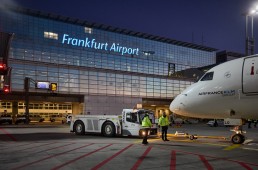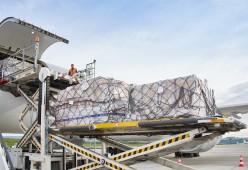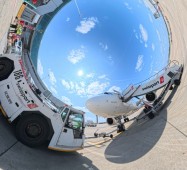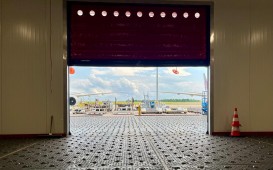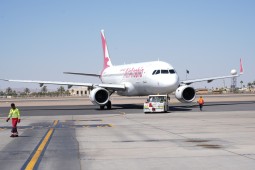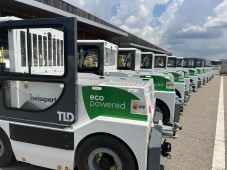Supporting greener airways - every action counts: Warwick Brady op-ed
By Warwick Brady, President and CEO, Swissport
Although Covid-19 has temporarily pushed environmental issues somewhat out of the spotlight we remain focused on sustainable operations at Swissport. As the global leader in aviation ground services, it is incumbent upon us to drive change in this respect, too. And we are fully committed to contributing our share in helping to make a greener aviation future a reality.
The aviation business and aircraft technology have seen profound transformation over the last few decades. Even since my last commercial flight as a pilot 20 years ago a lot has changed; next to offering a more pleasant travel experience, planes have become lighter and less noisy, and just as importantly, flying continues to reduce its environmental footprint thanks to advanced engine technology.
Individual efforts by airlines, airports, service companies and other stakeholders have all contributed to a tangible reduction in greenhouse emissions, notably CO2. With each new generation of aircraft, specific fuel consumption is further reduced by up to 25 percent, according to 'Klimaschutz Portal'.
Global aviation is responsible for 2 to 3 percent of all human-induced carbon dioxide (CO2) emissions according to IATA, but overall jet aircraft in service today are over 80% more fuel efficient than the first jets in the 1960s, according to the Air Transport Action Group.
The aviation sector and industry associations are relentless in their efforts to increase operational efficiency and further environmental sustainability. IATA had been working with member airlines to aim for an average improvement in fuel efficiency of 1.5 percent per year from 2009 to 2020. And global aviation continues to declare and commit to ambitious environmental targets.
Clearly, there has been a temporary hiatus in air travel due to the pandemic, but air travel will eventually recover to pre-pandemic levels, so it is vital that the sector redoubles its commitments towards a more sustainable ways and builds on the strong momentum of recent years.
At the end of 2016, CORSIA (the Carbon Offsetting and Reduction Scheme for International Aviation) was adopted by the UN aviation organization ICAO and as of July 2021, 104 countries had signed up to the scheme, including all the countries in the EU, as well as Japan, Canada, and the USA. The airlines of these countries account for more than 75 percent of international air traffic so this is a real statement of intent by the industry at large.
Our efforts at Swissport are closely aligned with the four-pillar approach adopted by many airlines, which is centered on technological investment, improved infrastructure, operational enhancements, and economic measures. For Swissport, technology and operations are the main levers. We are prioritizing the efficient use of resources, effective planning, lean processes and investment in eco-friendly equipment and infrastructure.
For example, we’ve been deploying electrically powered and hybrid ground support vehicles (GSE) wherever possible for years and, in 2019, we set ourselves the target that we wanted at least 50 percent of all our fleet to be electric or hybrid by 2025. As we are also aware of the importance of airport infrastructure to enable the use of such vehicles, we encourage airport operators to invest in charging stations required to charge passenger buses and other electric ground support equipment.
We are also working towards a more sustainable operation. As an example: To allow for our GSEs to be used more efficiently, we are looking at the potential of telematics. It could help us right size our fleet, maximize utilization and reduce engine idle running times. Such systems are sending alerts to equipment managers at predefined times, notifying them that engines are running unnecessarily.
We also invest in sustainable buildings when it comes to our infrastructure. The latest example here is our brand-new cargo warehouse at the airport in Frankfurt, Germany. The facility features the airport’s largest photo voltaic system, providing it with green energy.
In our aircraft fueling business, our focus on preventing fuel releases is paramount and we have implemented various environmental policies and procedures which are now an integral part of our training and daily operations. In our de-icing and anti-icing business, we keep the required amount of glycol to a minimum by frequently mixing it with biodegradable carbon-based de-icing agents.
If the aviation industry were a country, it would rank 17th in the world in terms of gross domestic product (GDP), generating $691.3 billion of GDP per year, which is about the same size as the Netherlands, according to the Air Transport Action Group, so it is vital that we do not undermine a sector that is so crucial to the world economy. I am convinced that global aviation can contribute towards global prosperity in a sustainable way. It is often presented as an “either or” debate, but the two are not mutually exclusive.
It’s also important to remember that aviation, is much more than transportation. While flying is almost indispensable for trips further than 1,500 kilometers, the wider benefits of aviation are vast when it comes to connecting countries, families, friends, and business partners. The flow of essential goods and global supply chains are also only possible thanks to a vibrant and functional aviation sector.
The aviation industry’s decarbonization roadmap will need continued dedication, innovation, investment and more than anything else, collaboration, to deliver on its ambitious goals. Every partner in the sector has a role to play and every action counts. At Swissport we are committed to keeping up our efforts and contribute to sustainable aviation which will benefit the whole world.
Contacts
- Christoph Meier
- +41 (0) 43 815 00 22
- [email protected]



